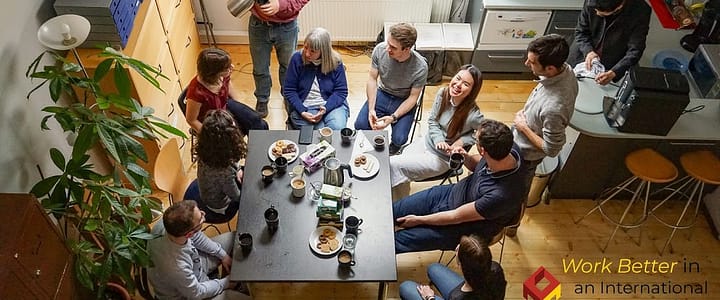We’re excited to be “syndicating” a blog post from Robin Terrell’s
amazing blog on the future of work (with a particular emphasis on the location-independent variety): The Global Mobile Worker. This post in particular was meaningful to us because it’s about the meaning of community, and in particular the community Robin found (and helped create! – Thanks, Robin!) at Locus.
Along with creating this blog and being a member of Locus, Robin is a Berkeley-educated lawyer, a writer (her book, Two Broke Chicas—a travelogue about her adventures traveling around Central & South America, Mexico, and Cuba with her partner–is available on Amazon), a technology / startup junkie, a proud Amazon employee.
We’re excited to be able to share her blog post here…
When I first arrived in town I used Meetup to find people who shared common interest. That led me straight to
Locus Coworking space. Once in the door, I quickly connected with both the startup community and the writing community, common members of co-working spaces. It has been almost three years now and although I never signed up to co-work at Locus, I realized that I spent time in one of the two spaces at least once a week.
When my new job took me away from Prague for months, my homecoming included reconnecting with my friends at Locus. I write every Saturday with a dedicated group, committed to various forms of media that involve the written word. We have bloggers, and novelists, and game script writers, and PhD students writing a thesis. We come from different countries, different generations, different genders. Our bond is a long-term fascination with words on a page.
It was through Locus that I joined my E-publishing Mastermind group that has single-handedly taken me from talking smack to preparing to upload my first ebook,
Two Broke Chicas, a Travel Series, December 26
th, just in time for people to use their Christmas gift cards and make their New Year’s Resolution to travel more. Mentor members, like successful sci-fi writer,
Bill King, have made my dreams come true.
While plopped on a big fluffy couch to wait for the group to start, I realized how important Locus was to my social life, and sense of being, in Prague. What my virtual membership gave me access to, besides one day a month and access to my e-Publishing Mastermind group, was a community. A place I could belong with people who shared my passion for a flexible work life.
Community = Thrive
Just like we need a Tribe, we need a community. Research found that people who belong to a co-working space report levels of thriving that approach an average of
6 on a 7-point scale. This is at least a point higher than the average for employees who do their jobs in regular offices. Read more:
Why People Thrive in Coworking SpacesGrind, is a growing network of coworking spaces in New York and Chicago. Community manager, Anthony Marinos, shared, “When it comes to cultivating our community at Grind, we’re all about the human element. We consider ourselves as much a hospitality company as we do a workspace provider. Our staff knows all of our members by name and profession, and we’re constantly facilitating introductions between Grindists.”
Research in
Forbes magazine showed that
entrepreneurs with larger and more diverse networks grow their businesses bigger.Co-working spaces can be a place for women, known for being great communicators and collaborators, who don’t excel at building power networks can find a safe space to start. (Women tend to build deep and narrow networks

while men wide and shallow ones.) I’ve added several women to my network from Locus, and started an informal dinner group to encourage young professional women to support each other, over a glass of wine.
Building Intentional Communities
Some experts believe that co-working space should be built more like
intentional communities. Example, Brooklyn’s
Friends Work Here. Founded by NYC-based Swiss-born designer and entrepreneur Tina Roth-Eisenberg, who’s also behind the international lecture series
CreativeMornings (which happens monthly in Prague, but mostly in Czech) and
Tattly. The space came as a response to Roth-Eisenberg’s negative experiences in “soulless” coworking places that are more focused on making money than cultivating inspiration among its members.
A Wealth of Human Resources
Locus is how I found my brief dog-sitting gig. I enjoyed several days of pretending to own a dog, forced to take several walks every day, which did wonders for my mental health. I’ve enjoyed people passing through town and people here for the duration, like my friend Sarah who first came when it was Czechslovakia, and still communist. She is at heart a historian, writes historical fiction, and loves talking about the history of this country she calls home, as a well-informed outsider.
It was hysterical and inspiring to sit in on Texas Holdem’ Poker night, where people from around the world turned into ruthless gamblers who might gut you for a pair of Ace. It was motivational to listen to Regina and Mike talk about becoming
Courageously Free, and through that relationship I was interviewed for their
podcast – which should be out just in time for my book launch.
There were people at Locus doing, looking for, thinking about the exact same things as I was. We all wanted to marry our fascination with social media and our passion for words. I could pick the brains of people who, like me, were inspired by Prague, determined to make their literary dreams come true. We figured out all kinds of ways to make money with words. My critique and Saturday writing buddy,
Beth Green, will fix your words for a fee. Which still leaves her time to search for an agent for her first novel, represent on Booklust and @bethverde, and be a Wanderlust columnist at
thedisplacednation.com.
My writing group has sustained me, in ways both creatively and emotionally, over noodles and pivo at the Vietnamese restaurant down the street from Locus. We’ve discussed our lives and our loves, U.S. and European politics and the meaning of feminism.
We’ve shared critique groups and book

launches, like Sonya’s soiree for
Under a Caged Sky, held at Locus Slezka, where we toasted with glasses of wine under the skylight, with Prague as the backdrop.
Staying Engaged

Once I’d had that moment of realization, that my co-working space was my community, I started to look around for other ways to participate. Engaged in the social media connection and found easy, fun ways to stay involved. I am looking forward to the Christmas Party catered by
Ethnocatering, a social enterprise of migrant women that serves authentic food from Georgia, Afghanistan, Belarus, Iran and Armenian. You can’t find this deliciousness in restaurants. I know, I said it, that bad M word. Well, I must own it because here in Prague, I’m a migrant. A tax paying, law abiding expat seeking shelter and new beginnings.
I know I’m not alone in this revelation and would love you to share your experience of finding community in co-working spaces. Tell us your story in the comment section here at the Global Mobile Worker Project.







 while men wide and shallow ones.) I’ve added several women to my network from Locus, and started an informal dinner group to encourage young professional women to support each other, over a glass of wine.
while men wide and shallow ones.) I’ve added several women to my network from Locus, and started an informal dinner group to encourage young professional women to support each other, over a glass of wine.
 Once I’d had that moment of realization, that my co-working space was my community, I started to look around for other ways to participate. Engaged in the social media connection and found easy, fun ways to stay involved. I am looking forward to the Christmas Party catered by
Once I’d had that moment of realization, that my co-working space was my community, I started to look around for other ways to participate. Engaged in the social media connection and found easy, fun ways to stay involved. I am looking forward to the Christmas Party catered by 

